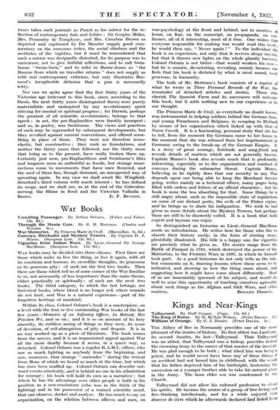War Books
WAR books may be divided into three classes. First there are those which make us live the thing, or live it again, with all its emotions and horrors, its swordlike thoughts, its gruesome or its generous pity : of such are the first two books. Then there are those which tell us of some corner of the War familiar to us, not necessarily of less importance than the main theme, either practically or spiritually : of such are the next two books. The third category, to which the last belongs, are historical books, where blood is no longer red, where wounds do not hurt, and War is a natural experience—part of the forgotten heritage of mankind.
Within its class, Colonel Osburn's book is a masterpiece, on a level with the four or five outstanding War books of the last few years—Memoirs of an Infantry Officer, In Retreat, Her Privates We, and so on ; and it is so on account of its fiery sincerity, its ruthless seeing of things as they were, its sense of devotion, of self-abnegation, of pity and despair. It is in no way worked up as a piece of literature. The book comes from the nerves, and it is an impassioned appeal against War all the more deadly because it seems, in a queer way, so detached. Colonel Osburn was a regular R.A.M.C. officer, who saw as much fighting as anybody from the beginning, and Saw, moreover, that strange " surrender " during the retreat from Mom of which we heard so much at the time, but which has since been muffled up. Colonel Osburn can describe out- ward events admirably, and is behind no one in his admiration for courage ; his book will hold its own as a narrative ; but whcre he has the advantage over other people is both in his position as a non-combatant (who was in the thick of the lighting) and in his possession of a trained scientific mind, that can observe, docket and analyse. He has much to say on organization, on the relation between officers and men, on
war-psychology at the front and behind, not to mention at home, on fear, on the conscript, on propaganda, on war. licence, all of it interesting, most of it true. One wishes that everyone responsible for making war would read this book. he would then say, "Never again!" To the individual the book is an experience, not only that it revives sleepy intents, but that it throws new lights on the whole ghastly business, Colonel Osburn is not bitter—that would weaken his case but he is caustic, devastating, revealing, mainly because one feels that his book is dictated by what is most sound, most generous, in humanity.
The bulk of Mr. Mottram's book consists of a reprint of what he wrote in Three Personal Records of the War, the remainder of detached articles and stories. Those who eherish The Spanish Farm and its successors will welcome this book, but it adds nothing new to our experience or to our thought.
The Princess Marie de Croy, as everybody no doubt knows, was instrumental in helping soldiers behind the German lines, and young Frenchmen and Belgians, in escaping to Holland by means of her organization which linked up with that of Nurse CavelL It is a fascinating, personal story that she has to tell, from the moment the Germans came to her house to -the moment that she was released from her imprisonment in Germany owing to the break-up of the German Empire. It is a story of great courage, fortitude and sang-froid, and reveals details of matters which are not generally known. Captain Mtunro's book also reveals much that is profoundly interesting, especially as to the organization and conduct of convoys during the submarine threat. Captain Munro, believing as he rightly does that our security in any War depends upon our being able to keep the Merchant Service going, writes mainly as a technical officer, many pages being filled with orders and letters of an official character ; but his book is none the less absorbing for that. Some things he is still angry about, such as the impossible state of regulations on some of our distant ports, the evils of the Fisher regime, and he brings us to share his indignation. We wish he had given us more details about the Mystery Towers, but perhaps those are still to be discreetly veiled. It is a book that both expert and layman can enjoy.
So distinguished an historian as Lieut.-General MacMunn needs no introduction. He- writes here for- those who like to absorb their history easily, in the form of stirring story, plentifully illustrated. His title is a happy one, for vignettes are precisely what he gives us. His stories range from the Battle of Paniput in 1761, which destroyed the power of the Mahrattas, to the Frontier Wars in 1897, in which he himself took part. As a good historian he not. only tells us the tale, but comments on it, drawing lessons where these seem to be indicated, and showing us how the thing came about, and suggesting how it might have come about differently. Most of us are lamentably ignorant of his subject, and would do well to seize this opportunity of teaching ourselves agreeably about such things as the Afghan and Sikh Wars, and other










































 Previous page
Previous page